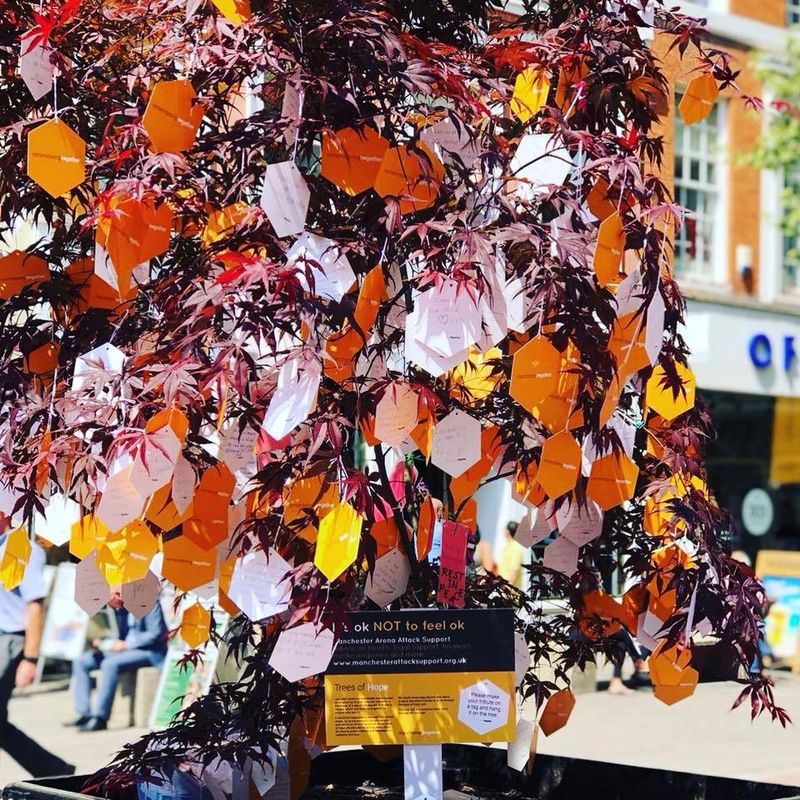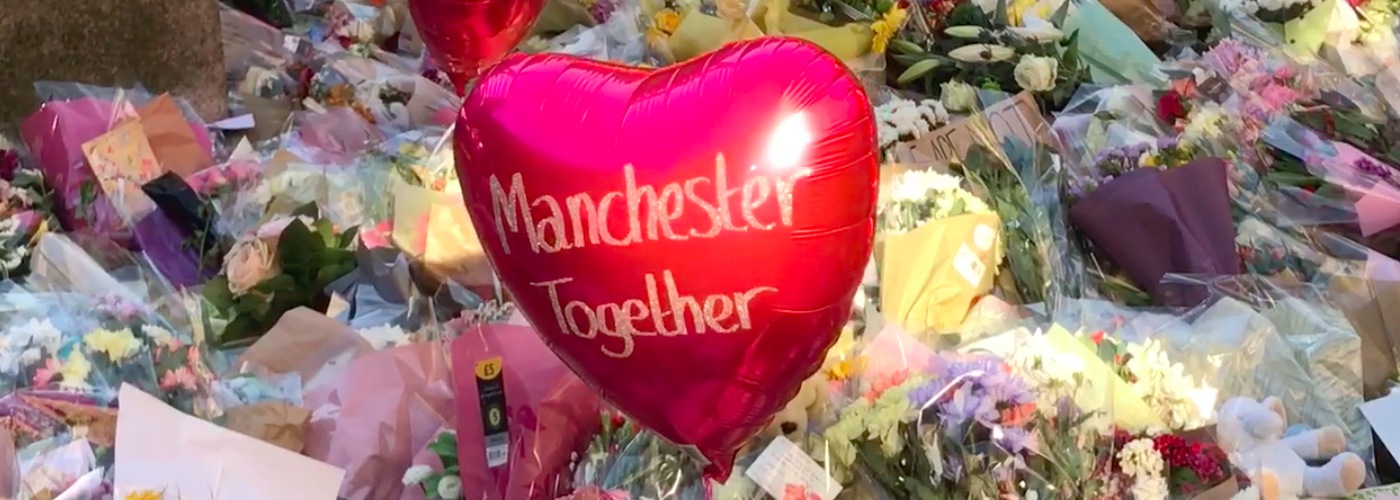City centre councillor Joan Davies reflects on a city together, but forever changed
Manchester will never forget Monday 22nd May 2017 when 22 people attending a pop concert at the Arena, many of them children, were killed in a terror attack.
That tragic event is now wired into our brains and into our hearts, we all know where we were when we first heard, how we as individuals responded, how the city responded, and how the outside world reacted to our response. Above all we know of bereavement, of determination propelling recovery, and of courage sustaining people as they face a life lived with life-changing injuries. And we know we still do not know all the stories.
One story yet to be written is the lasting impact on Manchester, Manchester the united city and its people.
This Tuesday 22 May is a time to pause, reflect and remembrance, before continuing with our life in the city, but never forgetting (details of how to take part in anniversary remembrance events are here).

The use of songs, flowers, personal tributes and community gatherings, with support from our public institutions, reflects the immediate and continuing response of Manchester.
The immediate response of the city was to help, in any way possible. Emergency services rushed to the scene, where casualties were already being assisted by a range of arena and security staff plus British Transport Police using whatever skills they had. Local residents, shops and cafes offered accommodation, tea and phone charging while taxis took people home for free.
First responders, the council and local hospitals were all trained for large scale emergency work, so plans were acted upon, casualties taken to the best hospitals for their injuries, a family liaison centre established, and communication with media streamlined. An official fund ‘We Love Manchester’ was quickly set up so that donations found their way to the right place and as an initial financial response to support families.
It was a very clear statement that Manchester would not be beaten, would not be blown off course by such an act
The Leader of Manchester City Council, Sir Richard Leese, and the newly elected Lord Mayor of Greater Manchester, Andy Burnham, gave a joint statement on the Town Hall steps that morning. A hastily organised vigil drew thousands to the early evening sunshine of Albert Square, the act of early remembrance and demonstration of resilience resonating around the world.
The country was in the middle of an election campaign; representatives from all major parties were present, but none were allocated a time to speak. Instead the voice of the city’s institutions, Lord Mayor Eddy Newman, The Bishop of Manchester, The Chief Constable, plus poet Tony Walsh spoke for us all.
Initially some thought the vigil too early, but it wasn’t. It was a very clear statement that Manchester would not be beaten, would not be blown off course by such an act. Similarly, the One Love concert performed at a later date by Ariana Grande and her new collection of friends spoke to healing and resilience.
The vigil was just the start of a public period of mourning. Flowers grew in number and bees arrived everywhere, on hand-written cards, as tattoos, on social media and in print. Some even buzzed around St Ann’s Square attracted by an ever-growing deep platform of flowers: a symbol of Manchester’s determined spirit that came to mean so much more.
Even as the city began to take life again, turning the corner into St Ann’s Square felt akin to entering a church, an oasis of calm and reflection where people dropped their voices, walked more slowly and left moved by the experience of love and support shown to complete strangers. It was in St Ann’s Square, when Mancunians gathered for a national minute’s silence, that Don’t Look Back in Anger became the anthem for a city’s sorrow and determination.
It was some time before the world’s press left. They’ll be back today.
Eventually the floral tributes needed to be removed. Soft toys were dried, cleaned and sent to be appreciated by children elsewhere. Flowers were pressed or composted, some contributing to today’s Trees of Hope tubs, while living plants were planted elsewhere in the city. All sensitively managed by Manchester Council Staff, with the assistance of volunteers from the public and private sectors working together.
So where are we now, looking back in anger, or merely sadness? Or are we looking forward?
We have to look back. We have to look back to look forward. We need to analyse what we did well and what can be improved. Andy Burnham’s decision to set up the Kerslake Report was an essential part of that process, providing a clinical eye to learn what went well and what we can do better.
Among the recommendations of the report, Fire Service decision making and communication will be improved so their resource can be better used should major disaster, of any cause, strike again. Partnership working and planning is praised in the report, with Manchester’s private-public sector partnership built on the national reputation gained after the 1996 IRA bomb. And in a first, Yorkshire felt so positive about the support provided for cross-Pennine concert visitors that they presented a special award to Manchester City Council.
The response from Manchester – and beyond – was incredible
The We Love Manchester Emergency Fund has astonishingly raised £21 million so far, quickly providing support for emergency needs and longer-term changes. Councillor Sue Murphy, Chair of the Trustees, said, “The response from Manchester – and beyond – was incredible. People really wanted to show solidarity and find a way to help the victims of the attack. Donations run from large donors to people giving their pocket money and every penny will go to help those affected.”
The efficiency with which allocation decisions have been made is impressive and the stories about individual recipients enlightening. Seeking advice from those who’ve travelled the road before, sharing it for potential future travellers and publishing progress is rewarding. You can read more here.
In the immediate aftermath of the bomb, hate incidents against Mancunian Muslims did spike, but quickly came down to pre-attack levels. Councillor Rabnawaz Akbar says “the resilience displayed by our residents is a manifestation of years of good community cohesion work that has been going on in Manchester by faith and community based voluntary organisation in partnership with the City Council and GMP."
Controversy around the government’s anti-radicalisation programme ‘Prevent’ remains heated at times, but people are listening and seeking solutions.
Our young people Manchester, often seen as living in a restrictive bubble, have had a very deep lesson in how wider society can wrap around people to provide support. A lesson in how plans, structures and organisations, even the church and politicians, can offer support in times of need, and how expertise gained by years of study and practice, for example the hospital surgeons, can help people to rebuild their lives.
On Tuesday 22 May, Manchester will mourn, will remember and will renew its determination, in poet Tony Walsh’s words, to ‘Choose Love’.
More info:
The Manchester NHS Resilience Hub has issued advice to help people deal with psychological issues around the anniversary of the Manchester Arena attack. You can contact The Hub by phone or email: Phone: 03330 095 071 / Email: GM.help@nhs.net / Phone: 03330 095 071 / Email: GM.help@nhs.net. Opening times are Monday – Friday 9am -5pm. You can find further details via the manchesteremergencyfund.














